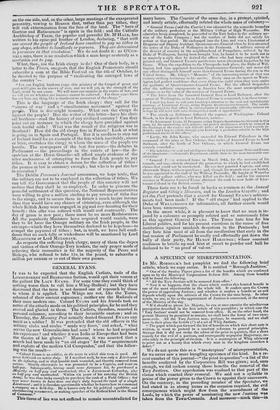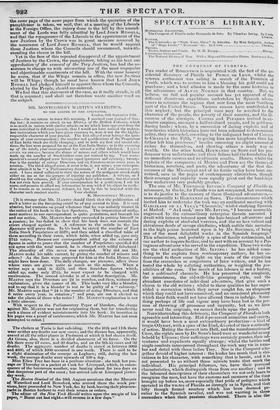A SPECIMEN OF MISREPRESENTATION.
IN Mr. ROEBUCK'S last pamphlet we find the following brief article, which we copy entire. It is entitled "Borough Justices.- " One of the Sunday Papers gives a list of the benefits which are conferred upon us by the Municipal Corporations Reform Bill. Among these benefits will be found the following.
" ' All the Tory Justices will be removed from office.' " Now it so happens, that the clause which confers this boasted benefit is one of the most objectionable in the whole bill. It confers upon the Crown the power of appointing Justices ; and whether it confers a benefit or an evil depends wholly upon the advisers of the Crown for the time being. In other words, we are, as far as the appointment of Justices is concerned, at the mercy of the Ministry of the day.
" If it should so please his Majesty, he can at once exercise the mischievous prerogative described in the first 'article of this pamphlet ; in which case the ' Tory Justices' would not be removed from office. If, on the other hand, the present Ministry be permitted to remain, we shall have the lesser of two enor- mous evils. All the Tory Justices may, perhaps, be removed, and we shall have in their place the benefit (?) of a set of Whig Justices. "Time paper which put forward the list of benefits on which this short note is written, is wont to pretend to a constant reference to general principles. Strange that it did not strike the editor of the print in question, that a Short remedy for the evil of a partisan, and consequently unpopular Magistracy, re- sides solely in the principle of election. It is a masterpiece of Whig advocacy to point out as a beauty that which every man in the kingdom considers a defect."
We do not quote this as a "masterpiece" of misrepresentation, for we never saw a more bungling specimen of the kind. In a re- cent number of this journal—" the print in question"—a list of the benefits conferred by the Corporation Bill was given; and, sure enough, we did reckon among these benefits the removal of the Tory Justices. Our approbation was confined to that part of the clause which enacted their removal. We said not a syllable in praise of the power given to the Crown to appoint their successors. On the contrary, in the preceding number of the Spectator, we had stated in as strong terms as the occasion required, the evil consequences which might flow from the amendment of the Lords, by which the power of nominating the new Justices was taken from the Town-Councils. And moreover—mark this—in tba Lame page of the same paper front which the quotation of the pamphleteer is taken, we said, that at a meeting of the Liberals at the Foreign Office, the injury done to the bill by this amend- ment of the Lords was fully admitted by Lord JOHN RUSSELL, and that the repugnance of the Liberals to the appointment of the new Ju3tices by the Crown was in great measure removed by the assurance of Lord JOHN RUSSELL, that he would appoint those Justices whom the Councils should recommend, notwith- standing the clause in the bill. Yet in the face of this repeated disapproval of the appointment of Justices by the Crown, the pamphleteer, taking as his text our approbation of the removal of the Tory Justices, has had the as- surance to charge us with advocating one of the most unpopular and objectionable enactments of the bill. With the same honesty he avers, that if the Whigs remain in office, the new Justices will be Whigs ; though lie must have known that Lord JOHN RUSSELL had pledged himself to appoint those whom the Councils, elected by the People, should recommend. We feel that this statement of the case, as it really stands, is all that is required ; and shall not therefore waste another word on the subject.



























 Previous page
Previous page